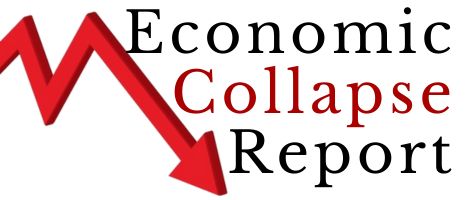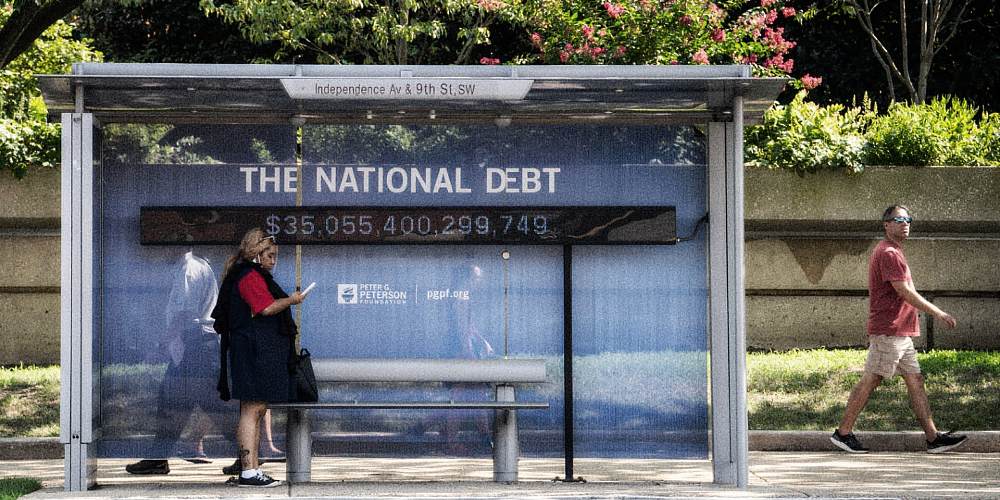(The Epoch Times)—The U.S. gross national debt surpassed $36 trillion on Thursday, according to Treasury data, while a Federal Reserve report showed intensifying concern about America’s fiscal health and its broader implications for financial stability.
The massive debt milestone was reached just over three months after the previous $35 trillion benchmark, highlighting the rapid accumulation of federal borrowing in recent years. It comes as policymakers brace for renewed debates over spending and taxation, with the incoming Trump administration and the 119th Congress having to contend with the nation’s fiscal trajectory.
“As if lawmakers needed any other reasons to take America’s fiscal health seriously, the gross national debt of the United States has now officially reached $36 trillion,” Maya MacGuineas, president of the Committee for a Responsible Federal Budget (CRFB), said in a statement. “Government borrowing is becoming as certain as the changing of the seasons these days.”
MacGuineas highlighted the risks of rising debt, including slower economic growth, higher inflation, and increased interest rates. She warned that high debt loads constrain fiscal flexibility, hampering the government’s ability to respond to economic downturns or global crises, pointing to $13 trillion in projected interest payments over the next decade as a stark example.
“The incoming Trump Administration and Members of the 119th Congress face several fiscal hurdles from the moment they take office–starting with the reinstatement of the debt ceiling in January and a $1.7 trillion PAYGO scorecard waiting to greet them,” MacGuineas said. “The way they approach that and other crucial decisions ahead like the expiration of discretionary spending caps and the 2017 tax cuts, as well as how they choose to offset the costs of their new policies, will determine our fiscal health for a long time.”
Meanwhile, respondents to a New York Federal Reserve survey that was cited in the Fed’s newly released semi-annual Financial Stability Report identified U.S. fiscal debt sustainability as the most frequently cited near-term risk to financial stability, overtaking concerns about persistent inflation and monetary tightening.
“Concerns surrounding US fiscal debt sustainability were atop the list this survey, followed by escalating tensions in the Middle East and policy uncertainty,” the report’s authors wrote. Fears of a potential U.S. recession and a global trade war also moved up in importance in the latest survey compared to the one carried out in spring.
In the Fed’s discussion of the near-term risks identified in the survey, which was conducted among some two dozen financial sector participants and observers from August to October, the central bank noted that rising geopolitical tensions and potential economic slowdowns could amplify vulnerabilities tied to the nation’s fiscal challenges and lead to “broad adverse spillovers.”
Escalation in conflicts such as the Middle East crisis or the war in Ukraine could disrupt global energy and commodity markets, triggering inflationary pressures and heightened market volatility. The Fed also warned of the potential for a sharp downturn in economic growth, which could lead to steep corrections in asset prices, particularly in overvalued sectors like equities and real estate.
High levels of corporate and nonbank financial institution leverage could exacerbate financial stress, while elevated public debt might limit the government’s ability to respond effectively to such shocks, the report’s authors noted. Further, the report underscored the growing risk of cyberattacks, which could disrupt the financial system by exploiting interdependencies among institutions and components of market infrastructure.
The Fed’s own financial stability assessment focused on a framework of risks across four key areas: asset valuations, borrowing by households and businesses, leverage in the financial sector, and funding risks.
The report noted that asset values “remained elevated,” with liquidity in financial markets remaining low, raising the risk of strain during periods of volatility. Vulnerabilities from business and household debt were described as “moderate,” though delinquencies in auto and credit card loans were elevated.
The banking system was described in the financial stability report as “sound and resilient,” though banks’ market-adjusted capital levels improved only “modestly” and so remain sensitive to interest rate changes. Hedge fund leverage was at its highest level in over a decade, while vulnerabilities in some short-term investment vehicles continued to grow.

It’s becoming increasingly clear that fiat currencies across the globe, including the U.S. Dollar, are under attack. Paper money is losing its value, translating into insane inflation and less value in our life’s savings.
Genesis Gold Group believes physical precious metals are an amazing option for those seeking to move their wealth or retirement to higher ground. Whether Central Bank Digital Currencies replace current fiat currencies or not, precious metals are poised to retain or even increase in value. This is why central banks and mega-asset managers like BlackRock are moving much of their holdings to precious metals.
As a Christian company, Genesis Gold Group has maintained a perfect 5 out of 5 rating with the Better Business Bureau. Their faith-driven values allow them to help Americans protect their life’s savings without the gimmicks used by most precious metals companies. Reach out to them today to see how they can streamline the rollover or transfer of your current and previous retirement accounts.
Kamala Harris Says the American Dream Is “Gone”
by Modernity News
During a pre recorded interview, Kamala Harris once again failed to deliver any substantive outline of her policies, primarily attacking Donald Trump’s outlook and his first term in office. At one point when speaking about the economy, Harris appeared to suggest, in stark contrast to Trump, that the American Dream…
Gold Price Forecasts Skyrocket Following Moves by China and the Fed
by Sponsored Post
With the Federal Reserve beginning what most expect to be a sustained easing cycle, momentum continues to rise for gold and silver. Values have been steadily rising and the newest forecasts point to even more gains down the road. At the end of September, BMO Capital Markets published updated commodity…
Taxes and Tariffs and Trade: Oh My! Trump’s Plan to Bolster the Economy
by Just The News
In a bid to build a broader coalition, former President Donald Trump has outlined a vision of tax cuts, import tariffs, and “reciprocal trade” to preserve and restore American industries. Since coming down the escalator of Trump Tower in 2015, the Republican standard bearer has espoused unconventional trade policies and…
Expert Testimony: Mass Immigration Under Biden-Harris Is Driving Up Rents for Americans
by Breitbart
The arrival of millions of foreign nationals, many of whom are illegal aliens, under President Joe Biden and Vice President Kamala Harris is helping to drive up rents for working- and middle-class Americans, an expert witness told Congress Wednesday. Center for Immigration Studies Director of Research Steven Camarota told the…
This Year Marks First Since 1958 That Us Held No Oil and Gas Lease Sales
by Just The News
This year will be the first year since 1958 that the Bureau of Ocean Energy Management held no offshore oil and gas lease sales. Energy expert Alex Epstein, author of “Fossil Future,” argued at a recent House Budget Committee hearing the United States’ record-high oil production is in spite of…
Kamala’s Devastating Middle Class Taxes
by Independent Sentinel
With the election coming up, the IRS plans to reduce our taxes for 2025. it’s a common tactic to make it seem like they won’t tax us into oblivion once they return to office. CBS News: Some Americans could see lower federal income taxes in 2025 due to an annual…
Congress Passes Stop-Gap Spending Bill After Failed Mike Johnson Gambit
by Breitbart
Congress on Wednesday passed legislation that would fund the government through nearly the end of December. The House and the Senate passed a stop-gap spending bill that would push the government spending deadline to December 20. The measure, otherwise known as a continuing resolution (CR), keeps federal spending the same….
A ‘Bipartisan’ Bar Tried to Open in DC, Then Libs Cried That an Elephant Image Was ‘Hurtful.’
by The National Pulse
A new bar in Washington, D.C., whose political theme focused on bipartisan agreement and debate, succumbed to partisan pressure before the establishment could even serve its first drink. Originally billed as Political Pattie’s, the bar was flooded with complaints by liberals who said the establishment’s logo—specifically the Republican Elephant—was offensive…
Newsom Signs Bill Requiring Janitors to Take $200 Sexual Harassment Training
by Just The News
California Gov. Gavin Newsom signed a bill requiring companies that hire janitors to make sure janitors take sexual assault training every other year, and pay $200 per participant for sessions with under 10 janitors present, and $8 for sessions with 10 or more janitors. The bill also requires the government…
Biden-Harris Regime Prepares Another $8 Billion in Military Aid for Ukraine During Zelensky’s Washington Visit
by The Gateway Pundit
The Biden-Harris regime is once again prioritizing foreign interests over the well-being of American citizens, with plans to announce an eye-watering $8 billion in military aid for Ukraine during Ukrainian President Volodymyr Zelensky’s visit to Washington. This massive giveaway comes as Americans continue to face economic hardships, skyrocketing inflation, and…
‘Economic Dystopia:’ Silicon Valley Tycoon Predicts AI Will Take Over 80% of All Work
by Breitbart
Vinod Khosla, legendary Silicon Valley investor and entrepreneur, has predicted that AI will replace the majority of work in most jobs, necessitating the implementation of universal basic income (UBI) to prevent economic instability and inequity. Fortune reports that in a recent blog post, Vinod Khosla, the billionaire co-founder of Sun…


